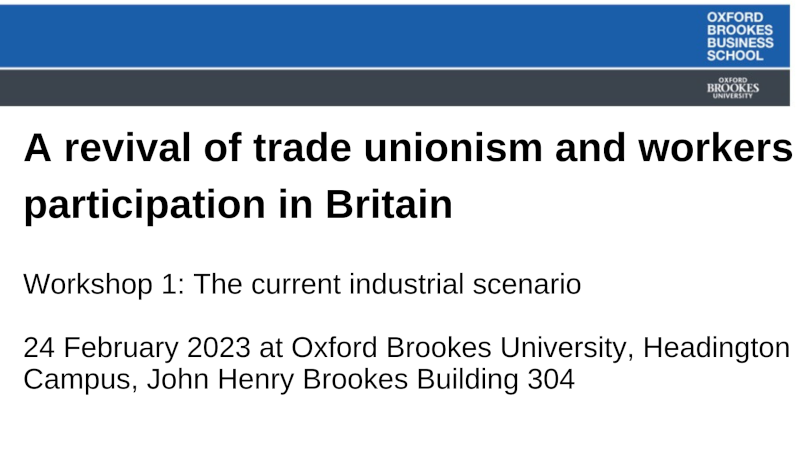A revival of trade unionism and workers participation in Britain?
We will discuss whether we are experiencing a renewed interest in trades unions and workers participation or not in the light of recent industrial disputes and changes in trade union membership.

Oxford Brookes University is hosting a series of two workshops on trade unions. During the workshops we would like to discuss whether we are experiencing a renewed interest in trades unions and workers participation in general or not in the light of recent industrial disputes and changes in trade union membership. The workshops are aimed at triggering future research collaborations among the participants and also establishing links between academic researchers and trade union activists. They will be open to postgraduate students, lecturers, researchers and trade union members. We will adopt an approach designed to link academics with activists, with an academic/practitioner focus.
Workshop 1, the current industrial scenario: February 24, 2023, 14:00 to 18:00, JHB 304, Headington Campus, Oxford.
In the first meeting we will conduct an overview of recent trade union activity, in particular the record of industrial action in the last year or two, plus discussion of trade union density, recruitment, regional patterns etc.
The purpose of the overview will be to identify key issues which could be focused on in revival strategies for unions. Such strategies will be the topic of the second workshop. Introductory remarks by Prof. Miguel Martinez Lucio.
Miguel Martinez Lucio, Professor of International HRM & Comparative Industrial Relations at Manchester University
Miguel has taught a range of modules over the past thirty years: Human Resource Management (both National and International), Employment and Industrial Relations, Public Policy and Management, European Public Policy, Research Methods, Management Theory/Business Environment, and the Sociology of Work. He was the co-ordinator and a co-founder of the Fairness at Work Research Centre (FairWRC) and an active member of the European Work and Employment Research Centre (EWERC) within Manchester University. He has been on a range of editorial boards and committees such as the International Journal of HRM, Work, Employment and Society, and Capital and Class. He is currently on the editorial board of the European Journal of Industrial Relations, Labor and Society, Cuadernos de Relaciones Laborales, Revista Accion e Investigacion Social, and Critical Perspectives in International Business. He has been an advisor and evaluator for various bodies such as trade unions (e.g. UNISON, UNITE, the CWU, UCATT, the TUC nationally and regionally, and the ETUC) and public bodies (e.g. BIS, ACAS, EC, and various local government organisations such as Manchester and Leeds). He is a founder member of Critical Labour Studies and a member of the trade unions UNITE and the UCU. He is a Fellow of the British Universities Industrial Relations Association.
Workshop 2, revival strategies: May 2023, Headington Campus, Oxford
In the second meeting (date to be confirmed) we will move on to more strategic issues, discussing possible ways forward for successful trade unionism. This could include new communication strategies, the role of indie unions, new local/central organising dynamics, embracing broader social issues (green new deal, Brexit, equality, alternative forms of workers’ participation…).
In Britain we are experiencing an increased turnover and shortage of workers in a very tight labour market. It is not yet clear what impact this will have on the industrial relations model. Currently we are observing that trades union membership is slightly rising, or at least has stopped declining sharply. But trade union density lamentably remains low. Possible explanations are that new members are not in employment or that employment has grown faster than membership. There have been some victories at sector level, but also failures, despite years of mobilisation (in HE for instance). We keep observing social and political shifts away from awareness of trade unions and the collective nature of solidarity.
While in the UK the experience of the pandemic showed the difficulties facing trade unions in influencing either management behaviour or government policy, the post-pandemic period appears to have seen a striking upsurge in activity both at a local and national level. This has been stimulated in large measure by significant cuts in real wages resulting from high inflation levels. Most notably we have seen a national strike called by the RMT on the railways, with further national action on the cards as a result of ballots in the CWU and other unions. At the same time there have been a number of local disputes in areas like the North West. British trade unionism then appears to be characterised by a combination of renewed militancy at one level coupled with significant limitations in advancing an alternative policy agenda which can have political and industrial influence. These two workshops will attempt to explore this contradictory situation and draw lessons for possible developments in the coming period.
